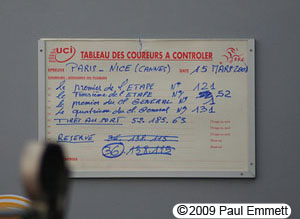 Former professional cyclist Joe Papp pleaded guilty to conspiring with a Chinese manufacturer to sell performance enhancing drugs in a federal court on Wednesday, according to the Pittsburgh Post-Gazette. Papp reportedly had more than 180 athletes as customers, which included cyclists, to whom he distributed Human Growth Hormone and EPO.
Former professional cyclist Joe Papp pleaded guilty to conspiring with a Chinese manufacturer to sell performance enhancing drugs in a federal court on Wednesday, according to the Pittsburgh Post-Gazette. Papp reportedly had more than 180 athletes as customers, which included cyclists, to whom he distributed Human Growth Hormone and EPO.
He pleaded guilty to two counts of conspiracy for trafficking the drugs between September 2006 and September 2007. Papp admitted to selling around $80,000 worth of the drugs.
The 34 year old was a witness for the US Anti-doping Agency during the 2007 doping case involving fellow American Floyd Landis. Landis tested positive for synthetic testosterone during his bid to win the 2006 Tour de France. Papp’s testimony explained how he used the banned substance to aid in recovery after races, refuting Landis’ and his legal team’s claims that testosterone could not help him win the Tour de France.
Landis lost his appeal to the Court of Arbitration for Sport (CAS) and was stripped of his Tour win. The American continues to maintain his innocence in the matter.
Papp has a plea agreement with the court, but the Associated Press reported that the details are sealed.
On May 7, 2006 Papp returned a positive urine sample for testosterone in a doping control during the International Presidential Cycling Tour of Turkey. He served a two-year ban for his positive result that ended on July 31, 2008. After his doping positive, Papp began speaking publicly about the dangers of using performance enhancing drugs.
Today, some 850 professional cyclists are required to report their whereabouts as part of International Cycling Union’s (UCI) biological passport program. The revolutionary system takes measurments of a cyclists key biological markers over time in order to detect changes that could indicate doping. Earlier this year the efforts by the UCI began to show promise with the first positive controls resulting from targeted testing. The WADA announced that the UCI’s innovative program will soon be introduced in other sports.
Today, some 850 professional cyclists are required to report their whereabouts as part of International Cycling Union’s (UCI) biological passport program. The revolutionary system takes measurments of a cyclists key biological markers over time in order to detect changes that could indicate doping. Earlier this year the efforts by the UCI began to show promise with the first positive controls resulting from targeted testing. The WADA announced that the UCI’s innovative program will soon be introduced in other sports.